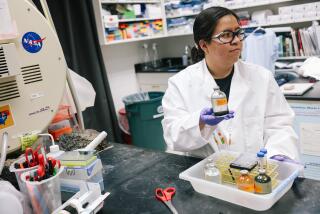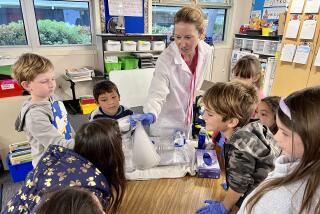To the Moon for Menudo! : Education: Why do so few Latinos go into scientific fields? Does the culture work against it?
- Share via
Not long ago I walked into the Bradbury Science Museum in Los Alamos, N. M., for the first time. I felt a boyhood urge to dash madly about, an excitement too large to contain. It swelled inside me, but I managed to maintain my composure and started looking around.
Everywhere were testaments of man’s creative genius and innate curiosity in the form of scientific exhibits. My eyes came to rest on a life-sized plaster cast of J. Robert Oppenheimer standing beneath a neon “RESEARCH” sign. I stood before him in awe. “I was born in East L.A.” were the only words I said. Then I reached out to “shake” the hand of a man who had done much to usher in the Atomic Age, for good or bad.
It came to me then that the boyhood urge I had felt upon entering the museum was very much still with me.
Years ago, my father took me to the Los Angeles Zoo, Griffith Observatory, the La Brea Tar Pits, and so forth, trying to satisfy my prodigious appetite for the why-and-how of everything that surrounded me.
My father was an immigrant from Central America who had worked hard from an early age. I doubt that he really understood the impact of his attentions; perhaps he just enjoyed seeing a smile on his son’s face.In any case, he did something very important, for which I will always be grateful: He nurtured a love of science in me.
Around my neighborhood in East Los Angeles, exploring meant cruising Whittier Boulevard, not the Milky Way. It was rough dealing with the sense of being different from my peers, in interests and priorities.
Jeffry V. Mallow states in his book, “Science Anxiety”: “From early childhood, most of us are taught that we cannot grasp science . . . (it is) for someone else: the brain, the oddball, the misfit. . . . Anti-science attitudes are quite the fashion.”
Though he referred to society at large, his observation is especially true of the Latino community, unfortunately. I honestly don’t know why this is so, but far too many of our children are being turned away from science at an early age. Is it because we Latinos, as a people, are still trying to get a secure footing in the mainstream of America, and so are more concerned with putting bread on the table? Is it because we are taught to accept and respect our heritage, traditions, and elders without questions? Or is it because we fear being outcasts within our communities--”oddballs,” “misfits?”
Whatever the reason, at home science has got to come out into the open, so that our children can feel free to explore without the fear of losing the support and respect of family and friends, roots that are so important.
It has been said that “the child is father to the man.” What a man learns in childhood will guide him throughout life. If he is admonished for staring at the stars instead of playing football, he may lose that spark of imagination so natural in a child. Let the child stare. Talk with him about what he sees. Better yet, sit and stare along with him.
It is natural for children to be curious about their world, to wonder about the sky above and the earth below. Indeed, for many of us adults, science is the very child within us, always smiling.
True, not every curious child is meant to be a scientist, but many more Latinos, men and women, should be going into the ranks of science than are doing so. This brings up a question: Are scientists made? That is, can we really affect how many of us go into science? I don’t know. It is sufficient to say that curiosity and imagination, the very seeds of science, dwell abundantly in children.
With understanding, attention, and nurturing, these seeds will bloom. We must at least give them the opportunity. This opportunity will come about by changing the climate of attitudes that sees the scientist as a caricature: a diabolical madman in a white lab coat and thick glasses, inventing new horrors to unleash on the human race.
Science is an honorable, fulfilling and worthwhile pursuit. It is not a threat to our culture, but rather one avenue into the future for our culture. Menudo in Los Angeles is great. Menudo in space would be even better.
More to Read
The biggest entertainment stories
Get our big stories about Hollywood, film, television, music, arts, culture and more right in your inbox as soon as they publish.
You may occasionally receive promotional content from the Los Angeles Times.










